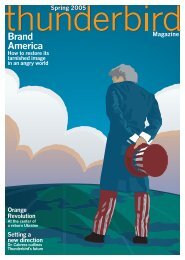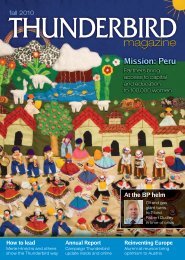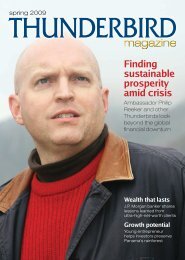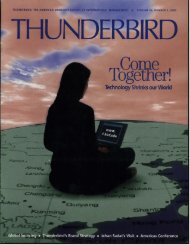Current Issue - Thunderbird Magazine - Thunderbird School of ...
Current Issue - Thunderbird Magazine - Thunderbird School of ...
Current Issue - Thunderbird Magazine - Thunderbird School of ...
Create successful ePaper yourself
Turn your PDF publications into a flip-book with our unique Google optimized e-Paper software.
tips & trends<br />
Illusions <strong>of</strong> privacy<br />
Facing four paradoxes <strong>of</strong> the digital life<br />
BY SIOBHAN<br />
MACDERMOTT ’05<br />
AND J.R. SMITH<br />
People worried about<br />
online privacy sometimes<br />
resort to extreme<br />
measures such<br />
as social media boycotts.<br />
But staying <strong>of</strong>f Facebook,<br />
Google+, LinkedIn, Twitter<br />
and similar sites does not<br />
guarantee that a person’s<br />
likeness and name will not<br />
be misused by others.<br />
In fact, people arguably<br />
sacrifice more control when<br />
they opt out <strong>of</strong> the social<br />
web because they do not<br />
know how others are using<br />
or abusing their information<br />
until someone happens to<br />
tell them about it.<br />
The truth is the Internet is<br />
not the real source <strong>of</strong> danger.<br />
Most privacy breaches result<br />
from the careless attitudes<br />
and distorted perceptions<br />
that people bring to the<br />
Internet. Our book, “Wide<br />
Open Privacy: Strategies for<br />
the Digital Life” (IT-Harvest<br />
Press, 2012) explores four<br />
common paradoxes <strong>of</strong> the<br />
digital world.<br />
Invisibility Paradox: We<br />
know the Internet exposes us<br />
to the world, which should<br />
put us on our guard. Yet sitting<br />
alone with a computer<br />
prompts many <strong>of</strong> us to lose<br />
our inhibitions and to express<br />
ourselves more openly,<br />
even carelessly.<br />
Impulse Paradox: Many<br />
<strong>of</strong> us view the digital world<br />
as an intense fantasy space<br />
from which instant escape is<br />
just a matter <strong>of</strong> logging <strong>of</strong>f.<br />
We feel we are merely playing<br />
a role without real-life<br />
consequences, and therefore<br />
we are liable to act on<br />
impulse. Yet one thoughtless<br />
act in this environment may<br />
create a digital footprint as<br />
permanent as the one Neil<br />
Armstrong left on the moon.<br />
Crowd Paradox: Online<br />
we might see ourselves as<br />
just one person in the crowd.<br />
This might give us the feeling<br />
<strong>of</strong> safety in numbers. Yet<br />
computers love big data.<br />
Even among billions, we can<br />
be picked out and tracked.<br />
Island Paradox: Accessing<br />
the world via the Internet<br />
makes many <strong>of</strong> us feel<br />
invisible, anonymous and<br />
autonomous — like islands.<br />
Yet wireless networks connect<br />
us to people and entities<br />
we’ve never even met.<br />
Think about these paradoxes<br />
before you post your<br />
next status update, photo or<br />
video.<br />
Siobhan MacDermott ’05<br />
has a <strong>Thunderbird</strong> Executive<br />
MBA. She is Chief Policy<br />
Officer <strong>of</strong> AVG Technologies,<br />
a consumer security s<strong>of</strong>tware<br />
company. J.R. Smith is CEO <strong>of</strong><br />
AVG Technologies.<br />
thunderbird magazine 49
















